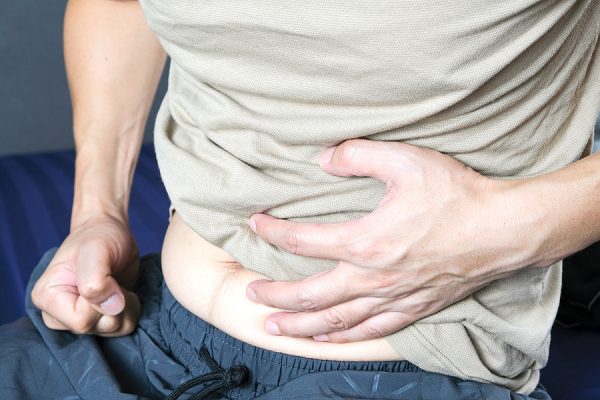In 2019, American adults spent over 1.5 billion dollars on over-the-counter laxatives!
Clearly, we are a nation of people with pooping problems. Otherwise, there wouldn’t be such a high demand for laxatives and stool softeners in our society.
But constipation doesn’t happen for no reason. There is always an underlying cause, whether it is diet, lack of physical activity or dehydration – and laxatives do nothing to treat any of these deficits.
As a matter of fact, in the large majority of cases, constipation is the result of an imbalanced gut microbiota, a condition known as dysbiosis. And all of the things I just mentioned can throw the gut out of balance.
To top things off, laxative use can actually worsen the condition. You might not realize it, but using laxatives has a long-lasting impact on the gut microbiome, causing even further imbalance.
That’s because the main content of a bowel movement isn’t just fiber. It’s bacteria. So if you bulk up on laxatives, and then pass a bowel movement, you still aren’t having the healthy bowel function you need. Rather, you are contributing to the problem.
Worse, laxatives can disrupt the epithelial barrier, which regulates nutrient absorption and prevents bacteria, toxins and other foreign substances from leaking out of your gut and into your bloodstream.
They can also create dependence. This means you might not be able to poop unless you take a laxative first. In a worst-case scenario, you might even develop an institutional bowel, which means you can’t have a bowel movement without an enema.
So while laxatives might be helpful in the short-term, long-term effects are, well, not favorable to good colon health.
A Possible Link Between Laxative Use and Dementia
More recently, researchers have discovered there may be an association between laxatives and dementia. While more research is needed to prove this conclusively, the results of their research was interesting.
They used self-reported data from approximately 500,000 adults between the ages of 40 and 69. After about 10 years of follow-up, they found that those who regularly used laxatives appeared to have more than a 51% increased risk of dementia compared to non-users.
And for people who took two or more types of laxatives, that risk increased to 90%.
Keep in mind that the study didn’t show a causal link. Still, the association is strong enough to bring up some serious concerns, and that’s just scary!
How to Resolve Constipation Once and For All
If laxatives aren’t the answer to constipation, what is?
Your best bet is to eat more fresh, organic, fiber-rich fruits, vegetables and legumes. Aim for 35 grams of fiber every day… but don’t load up just yet!
If you suddenly introduce too much fiber into your diet, it could give you just the opposite problem: diarrhea. And that will disturb your gut microbiota even further.
So gradually increase the amount of fiber rich beans, sweet potatoes, apricots, berries, greens and other plant-based foods into your diet over the next couple of weeks. This will slowly encourage healthy bowel movements without drastic over-correction.
Also, if you want your bowels to move, you need to move too! Physical activity improves transit time in the intestines, which helps relieve constipation.
And please! Don’t dismiss the power of taking a good probiotic. Look for a formula that contains a prebiotic along with lactobacillus, bifidobacteria and other strains of healthy bacteria. The higher the colony count, and the more live strains involved, the better off you’ll be. Just make sure to take it daily with food.
While you’re waiting for the changes to occur with lifestyle improvements, you should be able to stimulate some immediate relief with this little trick:
First, gently massage the pooping trigger point in your colon. It’s located in the lower left quadrant of your abdomen. (Gently move your hand in a circular pattern, in one direction. This will help fire it up for action.)
While you’re massaging your colon, sip on a little warm water. Before long, you should notice “things” moving again.
There are also acupressure points in your hand that can help stimulate bowel movements. Hold your right hand with the meaty side up, and massage the fleshy points below your fingers with your left thumb. Start just below the little right finger and work your way to the thumb. Continue circling for a minute or so. That has been shown to help get bowels moving.
I also recommend investing in something called a “Squatty Potty”.
It’s a stool that you place in front of the toilet to prop your feet on. And it places you in an extremely natural position to poop. (The same way your ancestors did when they squatted outdoors for elimination!)
It straightens out your colon in a way that reduces strain and more fully empties your bowels.
They’re not very expensive. You can pick one up for as little as $24.99 at SquattyPotty.com.
SOURCES:
OTC Sales by Category 2019. © 2023Consumer Health Products Association.
Vanhaecke T, Bretin O, Poirel M, Tap J. Drinking Water Source and Intake Are Associated with Distinct Gut Microbiota Signatures in US and UK Populations. J Nutr. 2022 Jan 11;152(1):171-182.
Singh RK, Chang HW, Yan D, Lee KM, Ucmak D, Wong K, Abrouk M, Farahnik B, Nakamura M, Zhu TH, Bhutani T, Liao W. Influence of diet on the gut microbiome and implications for human health. J Transl Med. 2017 Apr 8;15(1):73.
Yang Z, Wei C, Li X, Yuan J, Gao X, e al. Association Between Regular Laxative Use and Incident Dementia in UK Biobank Participants. Neurology. Feb 2023.
Li Y, Tong WD, Qian Y. Effect of Physical Activity on the Association Between Dietary Fiber and Constipation: Evidence From the National Health and Nutrition Examination Survey 2005-2010. J Neurogastroenterol Motil. 2021 Jan 30;27(1):97-107.




